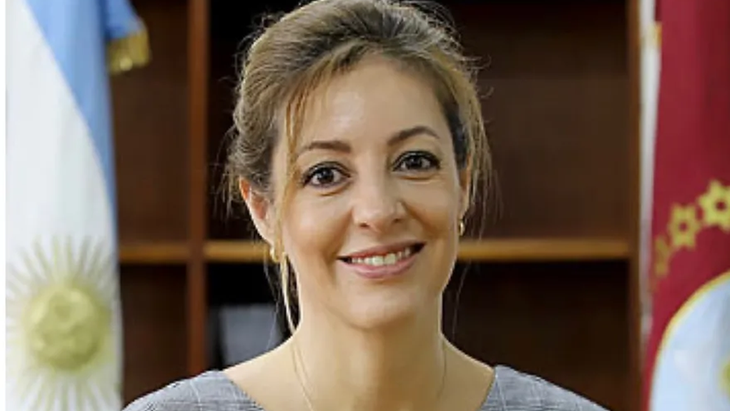Royón will be accompanied by “Santiago Yanotti as Undersecretary for Electric Power, Federico Bernal as Undersecretary for Hydrocarbons and Cecilia Garibotti as Undersecretary for Planning,” Massa wrote on her Twitter account.
flavia royon.png

In addition, the minister thanked “the work of Darío Martínez, Federico Basualdo and the team that has carried out the task in Energy up to now.”
“Everyone’s goal should be our energy sovereignty and the transformation of Argentina as a power in this sector,” he said.
https://twitter.com/SergioMassa/status/1556419526052438019
I announce that starting tomorrow Flavia Royón will join the team as Secretary of Energy, accompanied by Santiago Yanotti as Undersecretary of Electric Power, Federico Bernal as Undersecretary of Hydrocarbons and Cecilia Garibotti as Undersecretary of Planning.
– Sergio Massa (@SergioMassa) August 7, 2022
The appointment of the new officials and the departure of Martínez and Basualdo was “coordinated and consensual” between Massa, the vice president Cristina Fernandez de Kirchner and the head of state, Alberto Fernandeztrusted Télam official sources.
Flavia Royón is an Industrial Engineer from the National University of Salta, has a master’s degree from the IAE Business School and has a diploma in matters related to comprehensive mining production and management, business and agile methodologies.
Until now, she served as secretary of Mining and Energy of the Government of Salta and at the same time presided over the Economic and Social Council of that province.
From the beginning of his administration, he promoted the design and articulation of the Provincial Plan for Sustainable Mining Development and carried out projects to stimulate investments in exploration in the northwest basin; and the development of renewable energies.
Meanwhile, the new Undersecretary of Electric Energy, Santiago Yanotti, held the position of Vice President of the Administrative Company of the Wholesale Electricity Market (Cammesa) since June 2021 and previously served as Undersecretary of Coordination of the Secretariat of Energy.
For its part, Federico Bernalnew Undersecretary of Hydrocarbons, held the position of comptroller of the Regular Gas Entity (Enargas).
The outgoing secretary Dario Martinezserved as Secretary of Energy since August 21, 2020, when he replaced Sergio Lanziani.
Until then, he had held the position of national deputy, between 2015 and 2020, in charge of the presidency of the Energy and Fuel Commission of the Lower House.
Frederic Basualdooutgoing Undersecretary of Electric Power, was also an ENRE comptroller and works as a researcher in the Area of Economy and Technology at FLACSO (Argentina).
Segmentation
The changes in the energy area of the national government occur in the midst of announcements referring to the rates made by the Minister of Economy, Serge Massawho days ago confirmed the implementation of the segmentation and announced that in addition to the distinction by income, monthly consumption will be taken into account.
Hours after taking office, Massa anticipated that the almost 4 million households that did not request subsidies in the tariff segmentation “they will be the first cut” and will stop receiving the benefit, and anticipated that a scheme will be implemented to promote savings in energy consumption, when presenting the first economic measures of his management in a conference at the Palacio de Hacienda .
In that sense, Massa indicated that “among the more than 9 million who did ask to maintain the subsidy, saving by consumption will be promoted,” and he explained that up to 400 kilowatts will be subsidized in lightIn terms of gas, the haircut will follow the same logic and in water, the application of the haircut by segmentation will begin in September.
Speaking at the headquarters of the Palacio de Hacienda, the head of Economy explained that the measures have to do with the fact that “the global context made energy and water more expensive between 4 and 10 times according to the area of the world in which it touches.” live each one.
In this framework, Massa argued that, as a government, it faced “a segmentation that today shows us that almost 4 million households did not apply for subsidies, and that will be a first cut.”
“Among the more than 9 million who did ask to maintain the subsidy, we are going to promote consumption savings. Not only for the economy of public accounts, but also for the progressivity of the system and for efficiency in the use of resources. We cannot continue with a scheme in which whoever spends the most on energy or water is the one who receives the most subsidies,” he specified.
Specifically, he explained that in electricity “up to 400 kilowatts will be subsidized, reaching 80% of users but only 50% of total residential consumption.”
